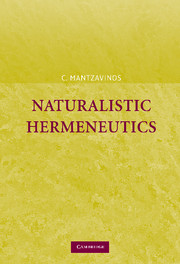Book contents
- Frontmatter
- Contents
- Preface
- Acknowledgments
- Naturalistic Hermeneutics
- PART I HERMENEUTIC DEAD ENDS
- PART II HERMENEUTIC WAYS OUT
- 4 The Problematic of Meaning: The Naturalistic Way Out
- 5 The Apprehension of the Meaning of Actions
- 6 The Apprehension of the Meaning of Texts
- Epilogue
- References
- Author Index
- Subject Index
6 - The Apprehension of the Meaning of Texts
Published online by Cambridge University Press: 13 August 2009
- Frontmatter
- Contents
- Preface
- Acknowledgments
- Naturalistic Hermeneutics
- PART I HERMENEUTIC DEAD ENDS
- PART II HERMENEUTIC WAYS OUT
- 4 The Problematic of Meaning: The Naturalistic Way Out
- 5 The Apprehension of the Meaning of Actions
- 6 The Apprehension of the Meaning of Texts
- Epilogue
- References
- Author Index
- Subject Index
Summary
LINGUISTIC EXPRESSIONS AS MEANINGFUL EVENTS
Besides languages, there is a whole array of symbolic systems that one encounters in everyday life, such as gestures, pictures, chess notes, music notes, and so on. The historically developed, natural languages may, however, be the most expressive symbolic systems, and they play an eminent role in our lives. Linguistic expressions, oral or written, are the result of human actions, and thus they are meaningful objects. Since spoken utterances and written texts, being human productions, are nothing other than meaningful events, I will treat them analogously to the way I treated human action in the previous chapter.
The most obvious question in the analysis of linguistic expressions is undoubtedly this: What is the meaning of a linguistic expression? Yet there are as many answers to the question of the ‘meaning’ of linguistic expressions as there are theoreticians of meaning. In order to presume as little as possible in my treatment of the problematic of meaning, I start with the following definition: Linguistic expressions are bestowed with meaning when, in producing them, the author construes them against the background of his goals, his beliefs, and his other mental states while interacting with his natural and social environments; such a construal of meaning is a complex process, and it involves the conscious and unconscious use of symbols.
From the perspective of the observer, the nexus of meaning that arises in connection with a linguistic expression can be apprehended by being externally described and, if necessary, nomologically explained.
- Type
- Chapter
- Information
- Naturalistic Hermeneutics , pp. 124 - 154Publisher: Cambridge University PressPrint publication year: 2005

